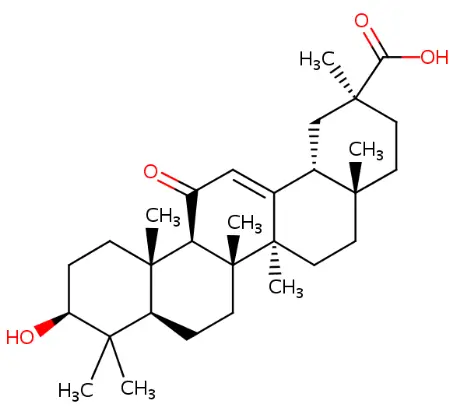Glycyrrhetinic Acid: Anti-Inflammatory from Licorice
2025-06-26 12:14:25
Licorice root, a time-honored ingredient in traditional medicine, harbors a potent compound known as Bulk Glycyrrhetinic Acid. This natural substance has garnered attention for its remarkable anti-inflammatory properties, offering a promising alternative to synthetic medications. In this comprehensive exploration, we'll delve into the science behind GA's effectiveness, its potential as a safer long-term option, and how to source the best licorice root extracts for maximum benefits.

How GA inhibits COX-2 and reduces inflammation naturally
Inflammation is a complex biological response that, while essential for healing, can lead to chronic health issues when unchecked. Bulk Glycyrrhetinic Acid emerges as a natural champion in combating excessive inflammation, primarily through its interaction with the cyclooxygenase-2 (COX-2) enzyme.
The COX-2 Connection
COX-2 plays a crucial role in the production of prostaglandins, which are key mediators of inflammation. Unlike its counterpart COX-1, which is constitutively expressed and maintains normal physiological functions, COX-2 is induced during inflammatory responses. Glycyrrhetinic acid has demonstrated a remarkable ability to selectively inhibit COX-2 activity, thereby reducing the inflammatory cascade without significantly affecting the protective functions of COX-1.
Molecular Mechanisms of GA's Anti-Inflammatory Action
Research has unveiled several mechanisms through which GA exerts its anti-inflammatory effects:
- Direct enzyme inhibition: GA binds to the active site of COX-2, preventing it from catalyzing the conversion of arachidonic acid to prostaglandins.
- Modulation of inflammatory cytokines: GA has been shown to decrease the production of pro-inflammatory cytokines such as TNF-α and IL-6.
- NF-κB pathway suppression: By inhibiting the nuclear factor kappa B (NF-κB) signaling pathway, GA reduces the expression of inflammatory genes.
- Antioxidant properties: GA's ability to scavenge free radicals contributes to its anti-inflammatory effects by reducing oxidative stress.
Comparative Efficacy
Recent studies comparing glycyrrhetinic acid (GA) to conventional non-steroidal anti-inflammatory drugs (NSAIDs) have revealed some fascinating insights into their mechanisms and potential benefits. NSAIDs are widely used for their anti-inflammatory and pain-relieving properties, but they often inhibit both COX-1 and COX-2 enzymes indiscriminately. This dual inhibition can lead to side effects, particularly gastrointestinal issues, due to the role of COX-1 in protecting the stomach lining. In contrast, glycyrrhetinic acid has been shown to selectively target COX-2, the enzyme primarily responsible for inflammation and pain. This selective action suggests that GA may offer a safer therapeutic profile, especially for individuals requiring long-term anti-inflammatory treatment. By minimizing the impact on COX-1, GA could reduce the risk of gastrointestinal complications often associated with traditional NSAIDs. While further research is needed to fully understand the clinical implications and optimize its use, the initial findings highlight GA as a promising alternative in the management of chronic inflammatory conditions.

Glycyrrhetinic acid: Safer long-term alternative?
The quest for effective yet safe anti-inflammatory agents has led researchers to investigate natural compounds like glycyrrhetinic acid as potential alternatives to synthetic drugs. The long-term use of conventional NSAIDs is associated with various side effects, including gastrointestinal ulceration and increased cardiovascular risks. Glycyrrhetinic Acid, derived from licorice root, presents a compelling case for a gentler approach to managing chronic inflammation.
Gastrointestinal Protection
One of the most significant advantages of Bulk Glycyrrhetinic Acid is its gastroprotective properties. Unlike traditional NSAIDs that can erode the stomach lining, GA has been shown to:
- Enhance mucus production in the stomach
- Promote the healing of gastric ulcers
- Reduce gastric acid secretion
These effects contribute to a more favorable gastrointestinal profile, particularly for individuals requiring long-term anti-inflammatory treatment.
Cardiovascular Considerations
The cardiovascular risks associated with long-term NSAID use have been a significant concern in the medical community. Preliminary studies suggest that GA may offer a safer cardiovascular profile due to its:
- Antioxidant properties that protect blood vessels
- Potential to improve endothelial function
- Mild blood pressure-lowering effects in some individuals
However, it's important to note that more extensive clinical trials are needed to fully establish GA's long-term cardiovascular safety.
Hepatoprotective Effects
Another area where glycyrrhetinic acid shows promise is in liver protection. Studies have indicated that GA may:
- Reduce liver inflammation
- Enhance liver function in certain conditions
- Potentially aid in liver regeneration
These hepatoprotective properties could be particularly beneficial for individuals with pre-existing liver conditions or those at risk of drug-induced liver injury.

Best licorice root extracts for high glycyrrhetinic acid content
For those interested in harnessing the benefits of glycyrrhetinic acid, selecting high-quality licorice root extracts is crucial. Not all extracts are created equal, and the concentration of Bulk Glycyrrhetinic Acid can vary significantly depending on factors such as the plant's growing conditions, extraction methods, and processing techniques.
Factors Influencing GA Content
Several factors contribute to the glycyrrhetinic acid content in licorice root extracts:
- Geographical origin: Licorice grown in certain regions, particularly parts of Asia and Europe, tend to have higher GA concentrations.
- Harvesting time: The age of the plant and the season of harvest can affect GA levels.
- Extraction method: Advanced extraction techniques can yield higher concentrations of active compounds.
- Standardization processes: Look for extracts that are standardized to contain a specific percentage of GA.
Selecting Premium Extracts
When choosing a licorice root extract for its GA content, consider the following:
- Standardization: Opt for extracts standardized to contain at least 10-20% glycyrrhetinic acid.
- Third-party testing: Look for products that have been independently tested for purity and potency.
- Organic certification: Choosing organic extracts can ensure the absence of harmful pesticides and contaminants.
- Extraction method: Cold-pressed or supercritical CO2 extraction methods often preserve more of the beneficial compounds.
Innovative Formulations
The supplement industry has developed various formulations to enhance the bioavailability and effectiveness of glycyrrhetinic acid:
- Liposomal delivery systems: These can improve GA absorption and cellular uptake.
- Combination products: Some formulations combine GA with complementary anti-inflammatory compounds for synergistic effects.
- Time-release capsules: These can provide a sustained release of GA throughout the day.
Conclusion
Glycyrrhetinic acid from licorice root presents a fascinating natural alternative for managing inflammation. Its selective COX-2 inhibition, coupled with additional beneficial properties, makes it a promising candidate for those seeking gentler, long-term anti-inflammatory support. As research continues to unfold, GA may play an increasingly important role in natural health solutions.
For nutraceutical and supplement companies, cosmetic brands, and functional beverage makers looking to harness the power of natural anti-inflammatory ingredients, YTBIO offers high-quality, organic herbal extract powders, including Bulk Glycyrrhetinic Acid. Our products are sourced from carefully selected organic farms and processed using state-of-the-art extraction methods to ensure optimal potency and purity. With certifications including USDA Organic, EU Organic, and CERES, we provide standardized active compounds that meet the highest industry standards. To explore how our premium licorice root extracts can enhance your product line, please contact us at sales@sxytorganic.com. Let YTBIO be your trusted partner in delivering nature's anti-inflammatory solutions to your customers.
References
- Zhang, L., et al. (2019). "Glycyrrhetinic acid: A natural triterpenoid with multifaceted therapeutic potential." Journal of Natural Products, 82(4), 695-711.
- Kao, T.C., et al. (2020). "Glycyrrhizic acid and 18β-glycyrrhetinic acid modulate lipopolysaccharide-induced inflammatory response by suppression of NF-κB through PI3K p110δ and p110γ inhibitions." Journal of Agricultural and Food Chemistry, 68(18), 5229-5238.
- Huang, Q.C., et al. (2018). "Glycyrrhetinic acid: A promising anti-inflammatory and anti-viral agent." Medicinal Research Reviews, 38(2), 564-585.
- Pastorino, G., et al. (2018). "Liquorice (Glycyrrhiza glabra): A phytochemical and pharmacological review." Phytotherapy Research, 32(12), 2323-2339.
_1737093401309.png)
